First and foremost, should you possess any negative preconceptions about Blockchain Gaming, the initial reading I recommend, "The Future of (Crypto) Gaming" may assist in fostering a more neutral and objective viewpoint.
Generally, thought leaders within a field often only glimpse the surface of neighboring fields, and in this case, many gamers are misguided by the overwhelming viral spread of negative feedback surrounding Blockchain Gaming.
In order to assess the weight you should attribute to the following analysis and understand potential biases, it's beneficial to know more about me.
Here's a brief overview of my gaming profile:
- I have been gaming for 30 years
- I am an aficionado of franchises such as Zelda, Civilization, and FIFA, and studios including Naughty Dog, Rockstar, and FromSoftware
- I predominantly enjoy single-player games
- I find myself mentally transported to a childlike state of wonder when I delve into the magic circle of gaming.
Conversely, my Blockchain Enthusiast profile can be summarized as:
- I initially glossed over Bitcoin in 2015
- I took a deep dive down the white rabbit hole of blockchain in late 2017
- I studied and comprehended the ideological underpinnings of blockchain during 2018-2019
- I transitioned to working part-time on blockchain-related topics in late 2019, then moved to full-time in mid-2020
- I rode the wave of the sector's blossoming during 2020-2021, participating in DeFi and NFTs, among others
Despite these developments, from the outset, what genuinely fascinated me about blockchain were the revolutionary use cases it introduced to the gaming sector.
Being an avid gamer, I quickly grasped this concept (though, incidentally, my timing was premature).
My relationship with Ultra might be perceived as biased... :-)
My encounter with Ultra in early 2020 felt akin to witnessing a messiah's arrival.
This project materialized the vision I had for the integration of blockchain into gaming. And to top it off, the co-CEOs' vision (articulated in French, no less) was highly enlightening and dispelled any lingering ambiguities.
However, it's challenging to remain impartial, especially given the growing anticipation surrounding the project. This is further compounded by the extreme volatility of the UOS token over the past three years, resulting in difficult decisions and frustrations (which could warrant an entire article in its own right).
With that said, and in the interest of accuracy, let's delve into what I mean when I refer to an "opportunity."
Defining "Opportunity"
In my view, the opportunity in Blockchain Gaming, specifically through Ultra, is tripartite: it's experiential, social, and financial.
Therefore, I believe it's time to share what could potentially be the most impactful article you'll encounter on your Blockchain Gaming journey.
An Experiential Opportunity
For gaming veterans like me, we've witnessed the emergence of home consoles, the revolution of 3D gaming, and the rise of online multiplayer experiences where the social layer becomes increasingly prominent. These experiences closely resemble what we now define as the metaverse (think Roblox and the like).
The advent of blockchain now promises to elevate your gaming experience to a whole new dimension. Here, we delve into something profoundly impactful: players embarking on an immersive journey that remains largely unexplored, driven by the creation and circulation of value through the tokenization of in-game assets.
This paradigm, made feasible by blockchain, will enable the replication of real-life economic structures, including:
- Organizations (most likely through DAOs)
- Value production chains
- Economic incentives
- Power dynamics
- Interest groups / Lobbies
... and so on.
Welcome to the Metaverse.
This virtual universe offers limitless possibilities. Tools, such as the Economy Engine and Metanomic (EDIT : acquired in 2023), designed specifically for game developers to craft game economies, are emerging to facilitate its creation with the necessary foresight.
Perhaps this will spur the development of new gaming experiences tailored to a mature audience. These could align perfectly with Maslow's hierarchy of needs due to the infinite possibilities offered by virtual worlds. Social interactions could occur largely unhindered by the constraints of the real world.
Nevertheless, immersion and addiction could become major concerns in this novel realm. The concept of the "Magic Circle" — the symbolic boundary separating the real world from the game — is often invoked to induce a psychological state of flow in players. This state of flow, characterized by complete immersion, peak concentration, and satisfaction in the activity, may be heightened to new levels in blockchain gaming.
The concept of the Magic Circle was introduced by Johan Huizinga in his 1938 book, Homo Ludens, and further developed by Katie Salen and Eric Zimmerman in their 2003 book, Rules of Play: Fundamentals of Game Design. Blockchain gaming might heighten the state of flow to such a degree that players could experience spiritual enrichment.
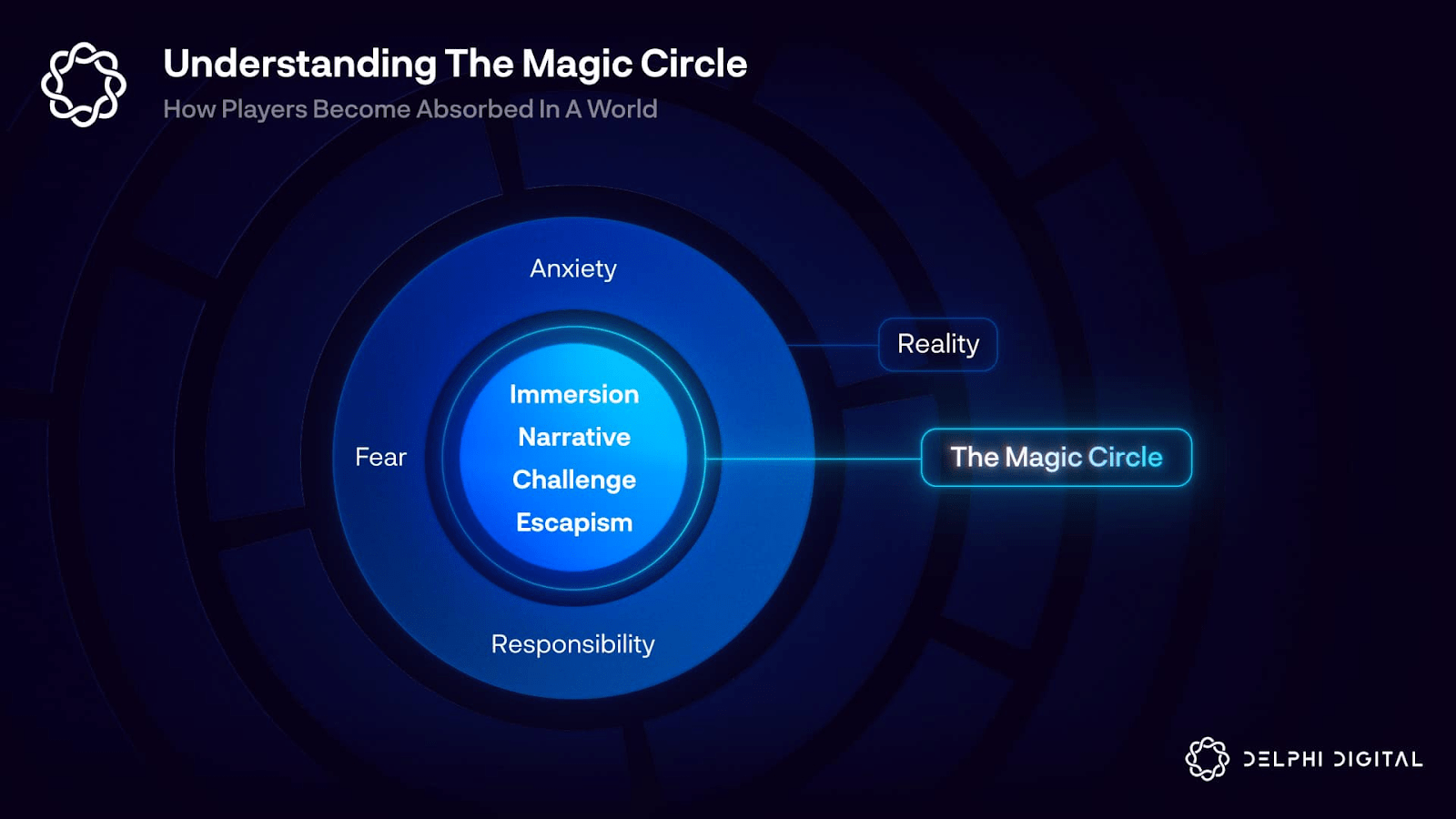
For a deeper understanding of the Magic Circle concept and the future of blockchain gaming via the PlayFi concept, refer to this article: "The Future of (Crypto) Gaming"
A social opportunity
This gaming experience presents a social opportunity where enjoyment converges with value creation, potentially enabling part of humanity to unlock its full potential. It's widely recognized that people, similar to animals, are most productive when they play.
The ability to create value while having fun collaboratively could revolutionize social dynamics. Communities of players may become tightly bonded around potent shared objectives, where enjoyment intersects with value creation in a virtuous, productive cycle. The concept of network states, highlighted by Balaji Srinivasan in his book “The Network State” and further expounded by Vitalik Buterin, co-founder of the Ethereum blockchain, in his article " What do I think about network states ?", is particularly relevant in this context.
Anticipate seeing strong communities and guilds committed to deriving pleasure from gameplay and participation in e-Sports competitions of unprecedented intensity due to the stakes and novel possibilities that unite the players. Ultra is launching its e-Sports tournament platform and recently formed a partnership with Xborg, which aspires to become the reference e-Sports hub of Web 3.0.
The emergence of powerful communities and guilds in this new era of blockchain gaming seems inevitable.
A Financial Opportunity
The logic here is straightforward: consider the current capitalization of the Ultra Project ($100M in Q4 2022) and project it onto a capitalization that would elevate the Ultra Project to:
- A pessimistic scenario, within the top 50 blockchain projects, or $1,200M capitalization today, translating to a performance of 1,100%
- A probable (subjective) scenario, within the top 20, or $5,100M, translating to a performance of 5,000%
- An optimistic scenario, where blockchain gaming is indeed the future of gaming (and Web 3.0), top 10 for Ultra, translating to a performance of 10,000%
It's critical to note that we're currently seeing quite low capitalizations, far from historical highs. Valuations at least 10 times higher could become possible due to capital entering the crypto market during bull runs, thereby multiplying the performance by the same factor as above, to:
- 11,000% (x110)
- 50,000% (x500)
- 100,000% (x1000)
You'll agree that these figures are quite staggering, and the title of this article isn't mere clickbait.
Additionally, without going into further detail, understand that due to the structural demand for the UOS token, its value could potentially surge even higher. For more details, refer to the "The value of the UOS token" section below.
To wrap up this section, I'll echo the sentiment of crypto-trading legend @HighStakesCap, who posits that if your convictions run deep, why not place a larger bet than usual and go all in? This is indeed a question worth contemplating here.
Founders Steeped in Gaming
Now, let's discuss the founders who have utilized their expertise for the project through an unconventional co-management model (they're both Co-CEOs). This model is extremely relevant in sectors where disruption is significant - say hello to Blockchain.
Harvard published an insightful post on this subject last month. This coincidence is quite intriguing: Is It Time to Consider Co-CEOs? (Harvard Business School Publishing).
David Hanson - Pragmatic Visionary
Personally, observing an Ultra leader articulating his vision month after month and realizing that it perfectly mirrors my own is genuinely exhilarating.
It feels as though there's this innovative genius who is constructing the gaming experience of my dreams, and all I have to do is sit back and enjoy the journey.
Moreover, his unique pragmatic approach regarding the need for a Web 2.0-like user experience to engage a mainstream audience is proving effective as the challenges of Blockchain Gaming surface in the bear market.
I confess that I had my doubts about this. Initially, I believed that the audience needed to adapt to Web 3.0, not the other way around. However, issues such as onboarding, the learning curve, the image of the crypto sector, regulation, fees, and security make it apparent that the general public can only appreciate the benefits of Blockchain Gaming through the UX skills of Web 2.0. Things may evolve later, but we must recognize that everything has its time.
Nicolas Gilot - Workhorse with a Giga-Brain
While we know less about Nicolas, his background and the few speeches he has delivered make it abundantly clear that he possesses the paramount quality for a successful entrepreneur: a strong work ethic. He's a tireless worker capable of overcoming obstacles in a startup or enduring development cycles that seem endless. Coupled with the likelihood that he's a giga-brain in his field, we have the ideal CEO duo.
Lastly, Nicolas exudes humility, which, in my opinion, is a vital characteristic for a successful entrepreneur.
To conclude
Their knowledge of the blockchain/crypto sector has enabled them to maintain a strong pragmatism in the face of soft utopian dreams of the blockchain, such as total decentralization, assumption of fees by users, or the hope of a 100% open-source techno.
The current bear market shows that they were right not to succumb to the collective euphoria of bull market hypes and speculative temptations. This is reflected in the company's traditional financial management (little or no exposure to digital assets), their long-term approach (focus on the business), the conservation of the UOS war chest, and the supposed absence of VCs in the UOS supply.
More traditional marketing, more inclusive outside the crypto sector
This point is particularly telling. While 99% of blockchain projects primarily communicate with a target of Web 3.0 users, Ultra manages to reach non-Web 3.0 profiles.
These are gamers who, seduced by the possibilities offered by blockchain for gaming, follow Ultra's development without necessarily being interested in the fundamentals of blockchain, DeFi, or Bitcoin. And that, I can tell you, is quite unique, particularly consistent with the mainstream vision that Ultra presents.
A Unique and Consistent Value Proposition
As mentioned before, Ultra remains focused on offering a product-market fit for all the actors in the gaming sector (players, developers, streamers, pro-gamers, etc.). Their value proposition is unique in the sense that it offers solutions to the problems of a sector, gaming, which could not exist without blockchain (see "High-Value Concrete Use Cases" below).
Most other blockchain projects, on the other hand, are more focused on creating needs and establishing new paradigms, seeking financial efficiency, disintermediation, productivity, or digital properties.
While these topics are exciting, and many industries will be revolutionized, unlike Ultra, the understanding of the real needs and expectations of users is still in the experimental stage.
This last point is, in my opinion, essential to justify the structural demand that there will naturally be on the UOS token, unlike 99% of other tokens, whose value is currently based mainly on speculation (or even a reserve of value) (see "Structural Demand" below).
Another strength of the Ultra project lies in its affiliate system. As an enthusiast and expert in affiliate marketing from my own professional experience, I can affirm that the virality of Ultra's system reaches a level of power rarely seen, not least due to the Blockchain infrastructure that underpins it.
Without delving into technical details, it's sufficient to understand that the technological nature of Blockchain makes it an ideal infrastructure for building a potent membership system.
Incidentally, I'd wager that this has something to do with the so-called 'Secret Sauce' that Ultra has been hinting at from the beginning B-)
I'll pause here on Ultra's value proposition, because I won't attempt to reinvent the wheel, and you can find an abundance of content detailing the staggering number of strong fundamental arguments in favor of Ultra.
Here are the most comprehensive sources for delving further into Ultra's robust fundamentals: Ultra Community (in English)
I strongly recommend you not to miss out on these articles, which will enable you to dive deeper into the Ultra project, comprehend its extraordinary potential, and draw your own conclusions. Then, you can explore Ultra's new NFT standard, which allows you to sell your NFTs without removing them from your wallet (thus, anyone can create an NFT dApp marketplace!).
I'd like to emphasize one last point, which reflects the pragmatism of the Ultra teams: NFT geofencing.
It may seem like a minor detail, but with legal constraints becoming increasingly crucial due to regulation, it appears to be a central and essential issue for a global product.
Going further
For my part, I'm going to share a few thoughts on the relevance of Ultra's place in Blockchain Gaming.
Reference SDK
The power and scalability of the SDK will be decisive for the fluid and rapid (and possibly multi-platform) integration of NFT-type digital assets by developers within their games.
It is very likely to be this SDK that will enable video game studios to offer gaming experiences as yet undreamt of, thanks to in-game value circulation mechanisms.
This SDK will be the source of a large number of use cases that will be highlighted as the creativity of designers takes them forward.
The Future Gaming Hub
Following the vision and development strategy of the Ultra ecosystem, various stakeholders in the gaming sector could have at their disposal all the necessary applications for a complete gaming experience: eSports tournaments, a distribution platform, item marketplace, streaming, social interactions, and much more. As new dApps are added by the Ultra community, a continuous network effect is created, continuously enhancing the relevance of the ecosystem.
The Emergence of Blockchain Gaming via eSports
If you've read the article The Future of (Crypto) Gaming, you would have encountered the concept of PlayFi where eSports occupies a pivotal role.
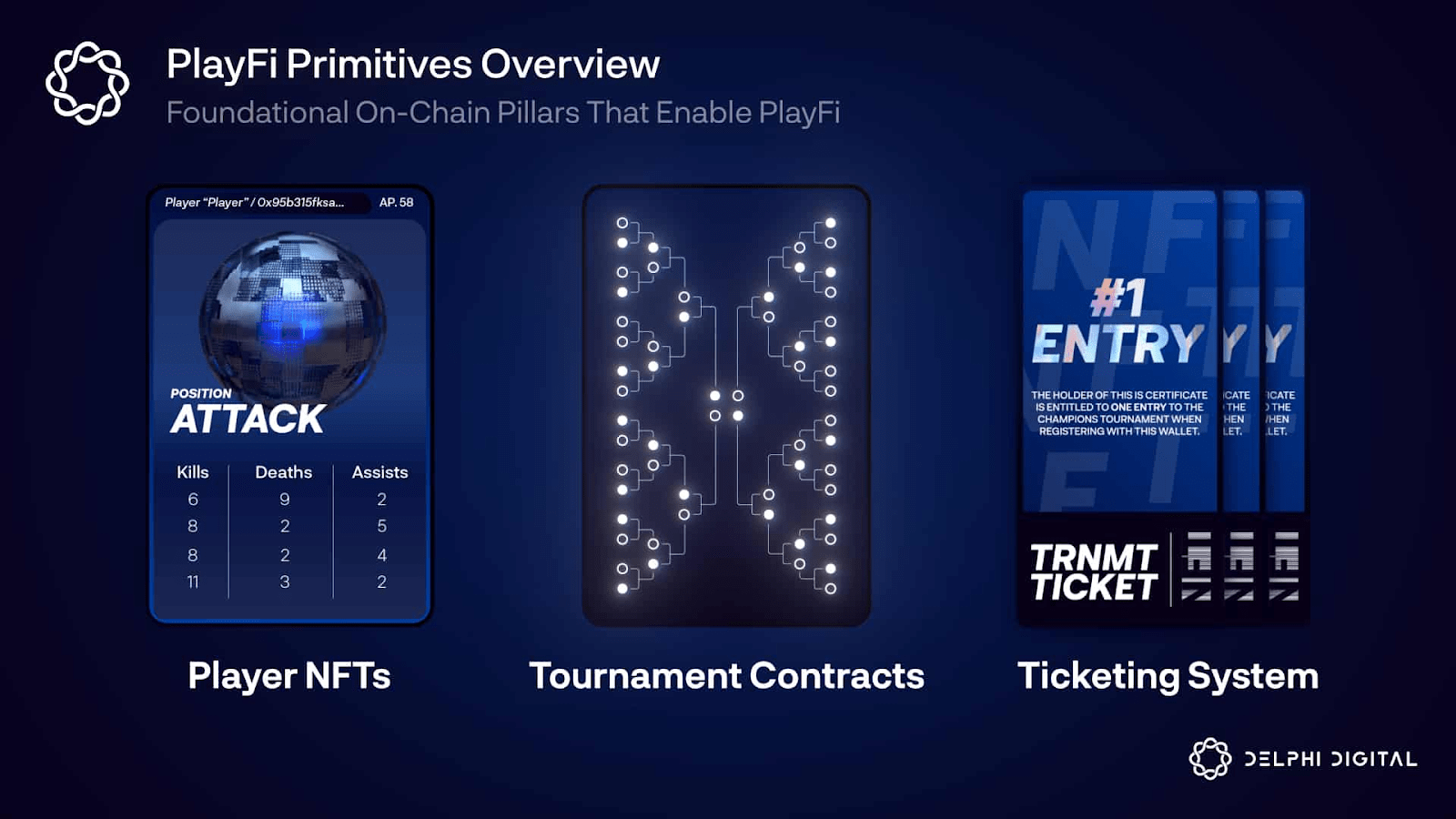
The article aptly suggests that to preserve the Magic Circle and not alienate gamers most skeptical about NFTs, eSports would serve as an ideal entry point. It could establish mechanisms unique to Blockchain Gaming without falling back into the pitfalls of Play to Earn.
If this topic interests you, I highly recommend reading this insightful article.
Has the Ultra team reached the same conclusion? We don't know yet, but the Ultra tournament platform is arriving soon and will be central to the ecosystem.
Integration of Third-Party Applications
Like any respectable infrastructure blockchain (the renowned Layer-1), the Ultra blockchain will permit third-party applications to integrate with the ecosystem, and users can connect via the Ultra wallet.
Ultra recently communicated about this:
Enabling the Wider Adoption of Ultra’s Networks
For instance, the first instances of lending/borrowing in-game assets should appear with AgoraDEX:
The time for Gamefi is now!
— Agora - Web3's Opportunity Arena (@AgoraHub_io) July 19, 2022
Agora is the beginning of a new GameFi era, powered by Ultra, a GameFi platform partnered with AMD, Ubisoft and The Sandbox, and partnered with SwissBorg, to leverage their 650k+ community.#GameFi #DeFi #AgoraDex
Association with the Metaverse
Originally, the concept of the metaverse stems from 3D virtual environments developed by the gaming sector. Gaming applications like Roblox have transformed into social exchange spaces where everything transpires in real time. Essentially, they are the new iteration of social networks, soon to be an integral component of the metaverse.
In these 3D universes, even if one is not there to play, the concept of digital assets will inevitably be significant, with mechanisms akin to those in Blockchain Gaming.
As such, Ultra, and its forthcoming Ultraverse, will be ideally positioned to encompass this new iteration of the Internet, known as the metaverse.
Notably, they've recently laid the groundwork for decentralized identity (DiD), which will undoubtedly be central to the metaverse, with the Ultra Discord bot. This bot will be capable of communicating your on-chain data while ensuring it remains under your control.
To learn more: Announcing Ultra Mainnet Discord Integration
Ultra Supporters with Little Interest in Blockchain
Interestingly, when exploring the amicable communities within the Blockchain ecosystem, Ultra emerges as one of the few projects where some members don't have a particular interest in Blockchain technology. These users, predominantly gamers, simply appreciate the remarkable new gaming experience enabled by digital ownership. They have intuitively grasped the added value that Ultra provides and are not biased by profit motives or their passion for the Blockchain revolution.
Among the hundreds of prominent projects I have reviewed, only StepN can claim to draw this type of user (although the allure of profit primarily drives this).
While this fact might seem insignificant, it strikes me as crucial.
While nearly all blockchain projects can realistically only expect to attract profiles of investors, traders, or Blockchain enthusiasts, Ultra has the potential to engage with pure gamers, a demographic of approximately 3 billion people.
EOS
The Ultra blockchain, a fork of EOSIO, which serves as the basis for the EOS Blockchain, is highly optimized for Ultra's needs. It provides a top-tier blockchain infrastructure that has already proven successful in the Blockchain Gaming sector via the WAX blockchain, the sector's frontrunner, which also operates through a fork of EOSIO.
This compatibility likely arises because the C and C++ languages used for EOSIO smart contracts are the most prevalent in the gaming market.
Additionally, this allows Ultra to leverage the development ecosystem of the EOS multiverse (as is already the case with some Block Producers).
The Most Promising Sector of the Blockchain Ecosystem
The Gaming Sector is Massive
Many people underestimate just how expansive the gaming market is. The latest statistics on the revenue generated by this industry are indeed eye-opening.
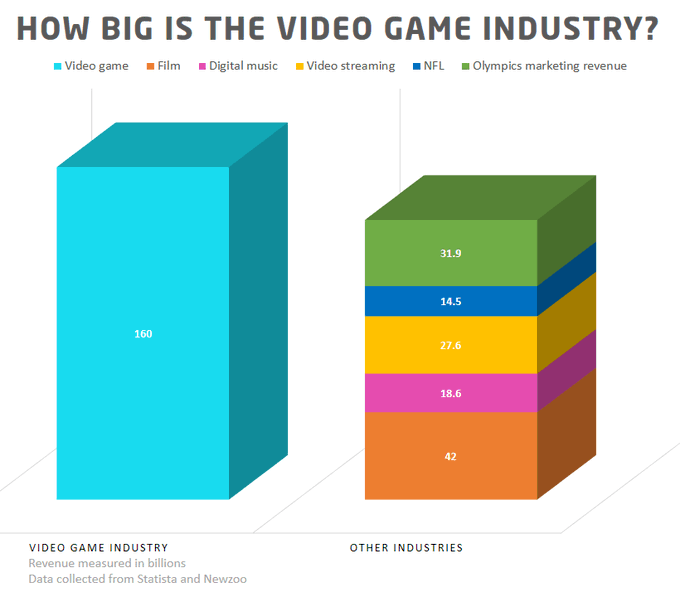
Yes, you're reading it right, the gaming market is larger than:
- The film industry,
- The digital music industry,
- Video streaming services,
- The NFL,
- The marketing revenues of the Olympics.
Combined, these sectors do not generate as much as gaming does - $160 billion in annual revenues.
Given the enormity of the industry, the value redistribution that Blockchain Gaming could enable could be quite phenomenal.
And if you're still not convinced, I recommend checking out the reports from Google for Games. They are enlightening: All Reports - Google for Games
Once this market size is comprehended, the next question becomes: Where does Blockchain Gaming stand in terms of momentum?
Timing & Hype: Who's Discussing It?
As clearly expressed in the Google for Games reports, the traditional gaming sector has strong, sustained momentum. But what about Blockchain Gaming?
In truth, in the Blockchain community, it's a prominent topic of conversation. People view it as the next significant development in the Blockchain sector.
The most discerning experts suggest that Blockchain Gaming presents the first mainstream use case. It's a platform where gamers can engage in a completely new gaming experience, and participate in a value distribution model that is much fairer and more incentivizing.
While I won't reiterate the strengths of Blockchain Gaming as mentioned above, it seems clear that the path forward is set.
But if that's truly the case, where are the investors?
They're present, and the interest is massive. Capital is flowing in like never before.
By cross-referencing certain data, the amount raised for the NFT / Gaming branch in the first half of 2022 is estimated at around $10 billion.
There's interesting data in Messari's latest report: H1 2022 FUNDRAISING REPORT.
Moreover, this sector appears to represent the most substantial portion of the pie:
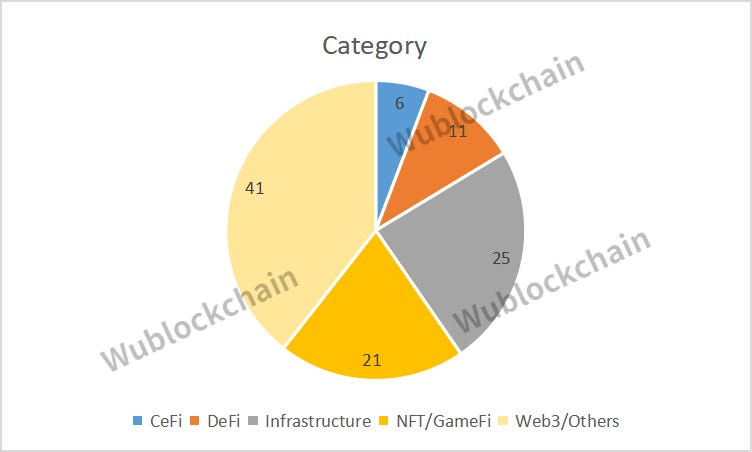
ahead of investments in DeFi and Blockchain infrastructure.
In short, it's colossal…
The on-chain data won't contradict either, with the number of GameFi transactions massively outweighing the number of DeFi transactions:
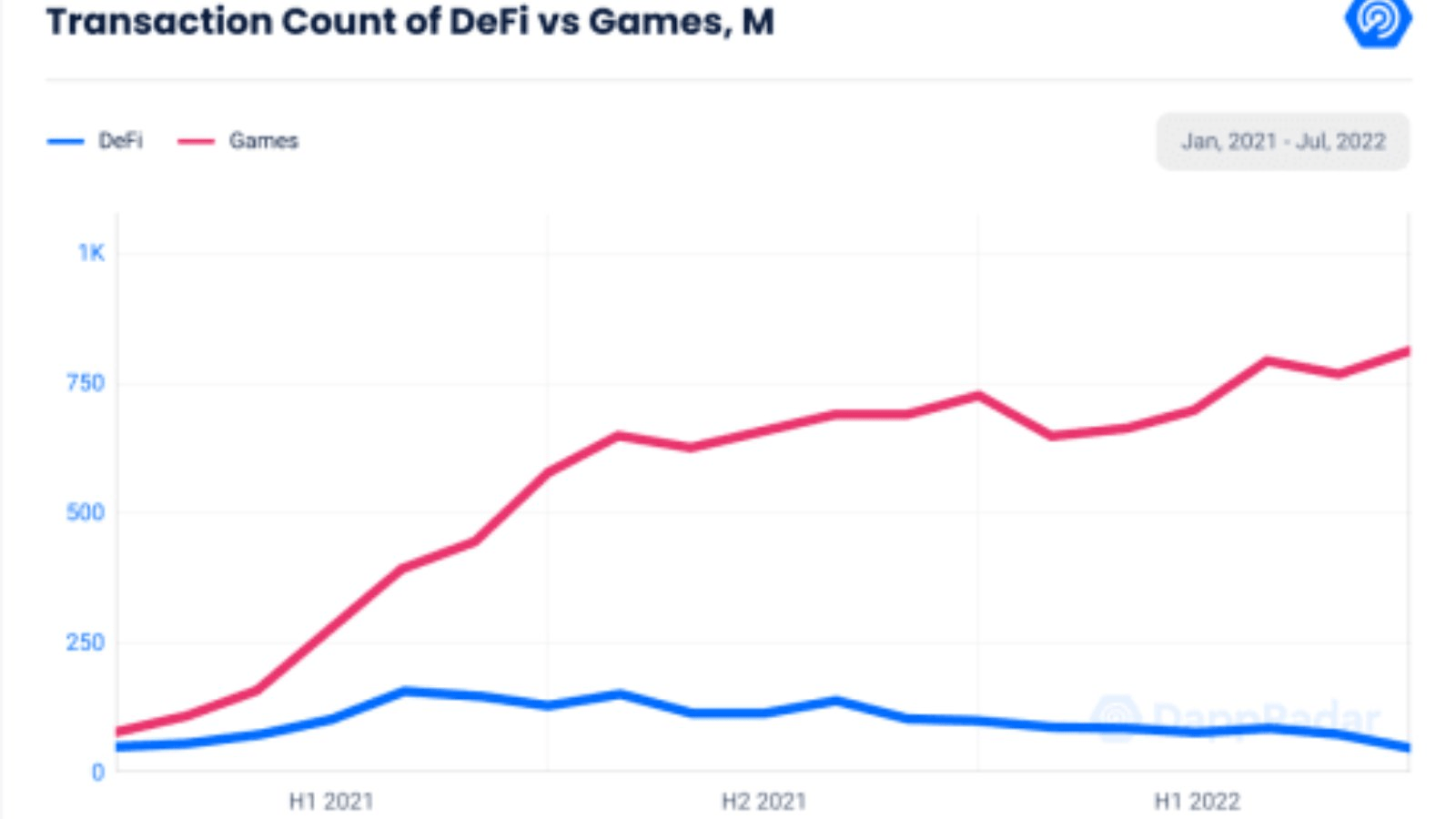
But after evaluating all these theoretical figures, let's try to understand practically why all the pieces seem to fit together so seamlessly between Blockchain and Gaming, using concrete use cases.
High-Value Concrete Use Cases
There are many use cases, and there will likely be a tremendous number as the sector reaches maturity.
For the theoretical aspects of what blockchain brings to gaming for both players and developers, you can refer to this article: The Future of (Crypto) Gaming, and their illustration below.
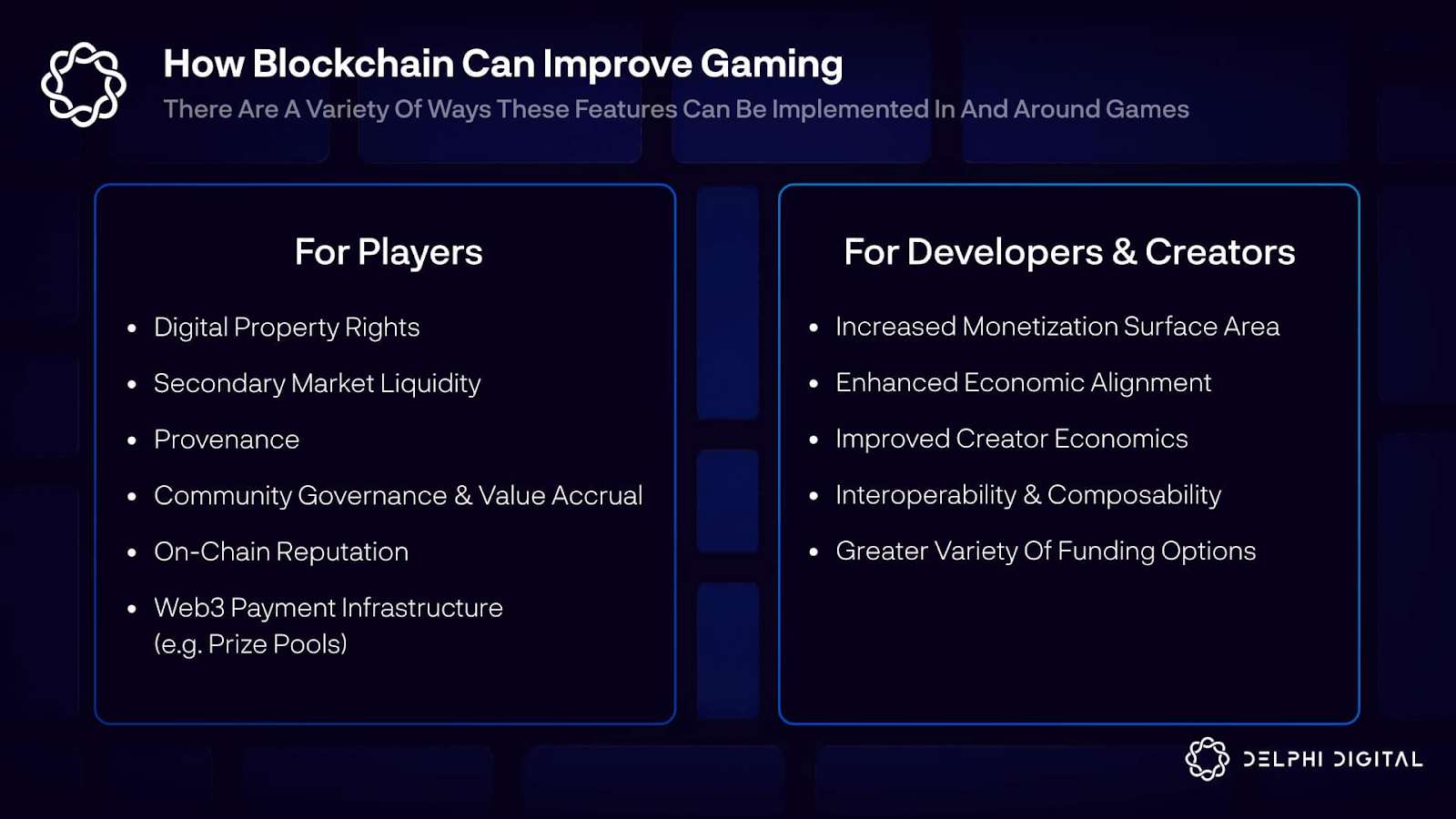
For my part, I have pinpointed a few concrete use cases that I believe are game-changers (also in the literal sense :-P).
Indeed, I outlined at the start of this thread the systemic impacts - in theory - that the creation and circulation of value within gaming would bring about. Now, let's look at some concrete use cases.
Cross-game (and cross-platform) NFTs
Suppose you're a sports fan, and hence, a fan of sports video games.
Your two go-to games?
- FIFA (on PC), notably its flagship mode FUT (Fifa Ultimate Team)
- NBA 2k (on PS5), particularly its flagship mode Myteam
These two game modes are quite similar: without diving into the specifics, you acquire player cards that allow these very players to join your team to compete against your online opponents. The better the player's statistics on the card, the more efficiently your player will perform on the field.
An actual economy has developed around these game modes, which generate substantial revenue for publishers and are often the genesis of international e-Sports competitions (cue the Ultra tournament platform).
So, what could a cross-game NFT bring to you in this particular scenario?
Well, we can easily envision having the same NFT that signifies a Messi card in FIFA, and a Lebron James card in NBA 2k. Based on this cross-game NFT example, acquiring one of the two cards implies you automatically secure the other card.
Indeed, concretely, if you purchase the Messi card on FIFA, then the NFT of this card will materialize in your wallet. And if you possess this NFT in your wallet while playing NBA 2K (on PS5), the game will detect and recognize the NFT of the Lebron card (since it's the same NFT for both cards, are you following me? :-))
This system notably allows gamers to capitalize on their playtime in FIFA, since their purchases (or efforts) made in FIFA can be useful in NBA 2K. In addition to being able to sell, rent, or exchange these cards, they have added value.
The possibilities are limitless. For instance, acquiring the Messi card doesn't necessarily have to provide the Lebron James card. It could instead offer a statistical boost to your existing Lebron James card.
Now, imagine a cross-game NFT that represents in-game assets that serve different functions (e.g., a FIFA FUT card and access to a hidden world in Zelda). This NFT could even provide properties outside of a game, like a 20% discount on a DLC. With this, any video game development studio could:
- Complement or extend an experience from a competitor's game,
- Incentivize (motivate or reward) a community of gamers holding a specific NFT,
- Offer an experience that transcends the game itself.
Each of these points could spawn detailed use cases for immersive experiences, marketing, loyalty programs, engagement strategies, brand partnerships, and more. This opens up a world of possibilities for Blockchain Gaming, where human creativity could lead to previously inconceivable gaming experiences.
There's an infinite number of cross-game NFT use cases. The key takeaway from this example is that players could capitalize or earn rewards based on their playing time. We can tokenize their performance, crafting, in-game purchases, and more, allowing them to benefit or monetize this in another game or context.
For the more technically inclined, think of the Blockchain as a giant open-source API for gaming and development studios. It can connect any player's asset to offer any advantage, function, or personalized experience.
Taking a step back, you'll see the astonishing power of this technology. If you're a marketer, you'll realize that such an approach is the holy grail of customer-centric marketing. In essence, this concept should be exciting for any gamer working as a Full Stack Marketer :-D
Incentive to use game mechanics
Another compelling use case is providing incentives for players to make specific choices within a game. This can benefit the community of the game or help the development studio ensure the longevity of the game or gaming experience.
Solutions are already emerging that collect data to understand the game styles that engage and motivate players. This data can help plan incentive mechanisms.
For instance, we could encourage players of an MMORPG to choose a specific class to rebalance the overall game experience. This could also help the development team maintain their initial vision, which could have been distorted by unforeseen player mechanics or even instances of abuse or cheating.
Ultimately, this application of game theory to Blockchain encourages players to make decisions in the general interest.
Savegame Tokenisation
This is a straightforward yet highly effective use case.
The demand for savegame tokenisation already exists, and it's bound to simplify life for many, starting with YouTubers seeking completed game saves to fully test a game on their channel.
Casual gamers, typically aged 30 and over, are also an ideal target. They would appreciate the ability to enjoy their favourite game under optimal conditions without investing dozens of hours they don't have to unlock the necessary elements.
More broadly, this would enable many players to capitalise on their gameplay time by selling their savegames. Others could easily acquire these saves to quickly engage in or explore a game experience they wouldn't have access to without completing the game 100%.
Personalising the Gaming Experience
It's easy to envisage personalised gaming experiences tailored to the player's desires. If a player owns or purchases a specific NFT, they can unlock an extra (such as a skin, level, skill, weapon, etc.) that they want to use in the game.
Monetising these extras, which a niche group of players might be willing to pay for, creates additional revenue streams for a development studio. It's even possible to envision the addition of specific community-driven experiences. In other words, players with governance powers (via NFTs or tokens) could vote for the introduction of certain extras and commit to paying for them via smart contracts.
Modding in the Era of Web 3.0
The creation of mods by a game's community is a significant topic and an untapped opportunity for modders, studios, and players alike. Currently, it's challenging for modders to monetise their work through license sales and royalties.
In practical terms, much like with the tokenisation of digital versions of games, NFTs offer solutions that allow modders to monetise their work without intermediaries. Tokenising mods will ensure:
- Authenticity, through the cryptographic signature,
- License income, through the acquisition of an NFT by the player,
- Royalties, through a commission on resale or usage.
Note that this concept could also apply to the console game emulation sector.
SoulBound Tokens (SBTs) Serving Reputation
SBTs, or SoulBound Tokens, are akin to non-transferable NFTs. This means that once they are in your wallet, they can only be destroyed.
SBTs will soon serve as digital proofs of ownership for goods, services, or documents (e.g., a degree). As such, an SBT could be issued to a FIFA national champion, for instance, providing them with access to certain privileges reserved for individuals with that status.
To put it concretely, imagine a poker player who has won a specific SBT. This could then unlock online access to a VIP table where many celebrities participate.
This concept aligns with the principle of Decentralized Identity (DiD) mentioned briefly above. It enables you to certify your identity and affirm that you do possess the necessary permissions (i.e., SBTs) to access a particular service.
Note that it's possible to apply this in real life: one could envisage winning an SBT during a gaming session that grants free access to an e-Sport event. While this is already possible today, issuing an SBT to the winner is greatly facilitated through blockchain technology, which assures its deployment, authenticity, and uniqueness. This makes the experience much more seamless and affordable for all parties involved.
Integration with the Metaverse
The concept of the metaverse originated from 3D gaming worlds. Without these virtual environments, which seek to reproduce reality and now include online functions that allow multiple players to share the same map, the idea of the metaverse as a new immersive 3D version of the internet might not have emerged.
Considering that blockchain technology is a critical requirement for a credible metaverse where digital ownership is possible, it's fair to speculate whether Blockchain Gaming could be the foundational piece of this edifice.
The Value of the $UOS Token
Pricing during the various pre-listing rounds
The UOS token's price during the different sales rounds was established as follows:
- Seed Price: $0.063
- Private Sale: $0.07
- IEO Price: $0.05
This resulted in a total amount raised of $11,381,611.
At first glance, this doesn't resemble traditional venture capital, but rather involves a few private investors on the Web 3.0 model. Notably, the Ultra team itself holds a large portion of the tokens.
From my perspective, this is preferable, as Ultra would have no interest in extracting disproportionate profits from the project. Especially since these 'profits' would be redirected towards supporting the growth of the ecosystem, content acquisition, and marketing.
Simply put, if the plan proceeds as expected, Ultra, much like Uniswap's cash position (which is, however, a DAO), will have a considerable war chest...
Structural Demand
In this article, "Predicting the price of the UOS token", you'll find a theoretical analysis of the potential structural demand for the UOS token.
In summary, it includes the following projections for the first 12 months after the Ultra platform's launch:
- Scenario 1 => 1.2 million players - UOS: $5.08
- Scenario 2 => 2.4 million players - UOS: $22.75
- Scenario 3 => 12 million players - UOS: $67.45
These simulations are based on concrete factors that structure the demand for the UOS token, which is the very core of the Ultra ecosystem.
These factors include:
- Game purchases
- Mining
- Advertising
- Reselling games
- Buying/reselling virtual goods
- Launching exclusive game(s)
What is critical to comprehend from this analysis is that it considers only the structural demand, i.e., the innate demand for the UOS token due to its utility within the Ultra ecosystem.
Consequently, it does not account for the speculative demand for the UOS token, which is currently the (sole) genuine driver of price increases for all tokens.
In conclusion, if you're a gamer who uses platforms like Steam, Epic Game Store, GoG, Ubisoft Connect, or even Origin to download your games, you'll inevitably be buying UOS (even indirectly), as you'll likely purchase a game on Ultra Games one day. So, while we're at it... B-)
A Wealth of Useful Features
The UOS token is not lacking in uses, and unlike many other projects, its uses are genuinely practical.
You can find all of these in this official article:
Token Flow and Use Cases [Updated]
In line with its commitment to creating an ecosystem that engages gamers, UOS will also function as an economic incentive for the following actions:
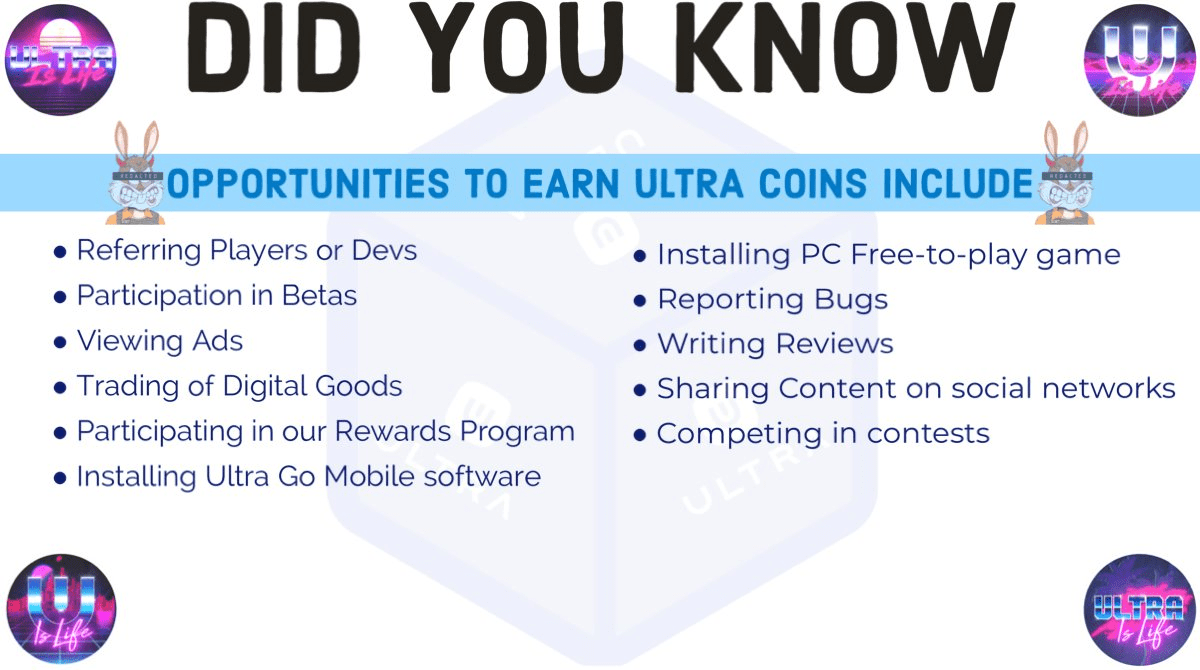
Liquidity
UOS is an illiquid token, meaning there are few buy and sell orders on exchanges, including Kucoin.
This has both advantages and disadvantages.
The primary disadvantage is that if you have a fairly substantial position (>$10,000), selling it today could potentially cause a price movement of 2% or more.
On the flip side, this scenario creates a supply shortage, which can trigger the well-known liquidity crises that often lead to surges in the prices of crypto assets.
Moreover, I suggest you examine an on-chain analysis on Etherscan to comprehend the extent of the current accumulation by large portfolios who seemingly have an understanding of the future price trajectory:
- The TOP 100 Holders of UOS alone account for 90.1% of the supply, and they are generally well distributed (no VCs).
- Only 6% of UOS are liquid (= CEX + DEX), for instance, BTC is 22% + PARTICULARLY all derivatives!
Out of this 6%, an unknown proportion of Holders remains on exchanges and an indeterminate share may be dedicated to market-making activities to provide liquidity (continuous buying and selling).
So, we probably have less than $20,000,000 worth of liquid UOS tokens at the moment (6% of supply = 60m UOS tokens = approximately $20m).
Therefore, it would only require a whale to step in, and the supply of tokens could dry up entirely...
Listing
UOS is not currently listed on FTX, Coinbase, or Binance.
I think that speaks volumes ^^.
When the listing occurs, it's likely to generate a significant marketing impact as always, and the low liquidity will probably result in substantial volatility.
The Opportunities That Could Arise from Ultra's Success
If, like me, you are persuaded by the value proposition of the Ultra project, let's be proactive and forecast its success to pinpoint now the opportunities that it could generate in the next phase.
Evaluating the Price of the $UOS Token
As previously discussed, the success of the Ultra ecosystem will structurally elevate the price of the UOS token.
Consequently, some might perceive this as a financial opportunity (after conducting their own research, of course...).
Early Adopters of a New Gaming Paradigm
Blockchain Gaming, especially in the form of Ultra, will introduce a new paradigm to gaming.
Inevitably, Early Adopters will profit from their ahead-of-the-curve status and may even establish themselves as opinion leaders.
Comprehending the future of gaming and engaging with it today will create opportunities for those aspiring to build a career in this entertainment sector.
Ample Opportunities for Pro-Gamers
The pro-gaming industry is constantly expanding, largely due to e-Sports, but the sector struggles to generate profit.
The novel economic mechanisms brought by Blockchain Gaming are very likely to cause an explosion in this industry's volume.
Without a doubt, pro-gamers, both established and emerging, who embrace this trend will significantly advance their goals.
E-Sports is poised to be a central topic, if not THE central topic, of Blockchain Gaming, and possibly the metaverse.
Potential Downsides
Let's now explore what could potentially hinder the Ultra project's success, and therefore the associated risks.
Too Perfect? Suspicious...
This is a paradoxical argument: Isn't an opportunity like this too good to be true? Too easy too.
As the saying goes, if something seems too good to be true and too easy, there's likely a catch.
As a precaution, I personally tend to be skeptical in such scenarios.
Therefore, this counter-argument is irrefutable.
A Reluctant Gamer Community?
The negative publicity generated by Ponzi scheme games like Play2Earn has tarnished the image of Blockchain Gaming. The confusion and lack of knowledge about NFTs' functionality have also contributed to this.
Consequently, many gamers, including significant influencers, have succumbed to prejudices and misconceptions. The problem could be that Blockchain Gaming becomes mired in clichés and is ignored due to misunderstandings.
However, it's worth noting that Asian countries are generally more receptive, as most of them were introduced to gaming through mobile and Free-to-Play options
Limited Decentralization ?
Yes, Ultra is a particularly centralized project. As someone who deeply values the principles of blockchain, this is disappointing to admit.
However, based on our observations to date, it's clear that:
Complete decentralization is a far-fetched dream.
Users don't want to bear 100% responsibility for their assets.
This results in efficiency issues, paradoxically caused by trust problems.
But will this lack of decentralization drive users away from an ecosystem like Ultra?
I doubt it.
Ultra's target audience consists of gamers, not staunch blockchain idealists like myself :-D
Various Potential Failures
The number of transactions per second that the Ultra blockchain can handle may not meet the ambitions of the Ultra project.
However, if this becomes an issue, the project will already have been quite successful, and Layer-2 solutions could be introduced.
Another concern is that the project's lack of decentralization leaves us at the mercy of the Ultra company's financial stability. If the company encounters serious legal issues or poor management, the entire ecosystem could collapse (hence the need for decentralization, darn it! :-P).
Lastly, suppose Ultra struggles with delivery: the ecosystem falls behind and gets surpassed. Or worse, it fails to deliver a stable product, resulting in partners, developers, and users departing.
Conclusion
There are few truly plausible negative points...
So, if you can identify any others and share them in the comments, we would greatly appreciate it! :-D
This might help challenge and soothe the FOMO that has gripped all of us, including myself, who understand the potential of the Ultra project ^^.
Conversely, if there are no credible negative points, it's likely to exacerbate the FOMO :-D
Staying Ahead of the Curve
After reading through this analysis (and conducting your own research), you might be wondering how to best prepare yourself.
Here are a few tips, particularly if you're new to the ecosystem..
Leverage the Momentum
Assuming Ultra has a high likelihood of success, why not anticipate this and leverage the momentum it's likely to generate elsewhere?
For instance:
- If you're a developer, consider developing on the Ultra blockchain.
- If you have a network, consider establishing a Web 3 guild.
- If you're a passionate gamer, start accumulating assets on Ultra's Uniq Marketplace.
- If you're a pro-gamer, try to get access to the Ultra Tournament Platform Beta.
- If you're a content producer, consider joining Ultra Times ;-)
- Etc...
If you're a gamer and you believe in the Ultra project, look for opportunities that could benefit from Ultra's momentum.
After all, this could be your chance to turn it into a vocation.
Whatever path you choose, Ultra Times is here to help you navigate the Ultra ecosystem and Blockchain Gaming.
So follow us and get ready, because the journey is just starting... ;-)
Preparing Mentally for HODLing and Reselling
If, besides enjoying a new gaming experience, you're also planning to invest in the UOS token (a decision you should make independently and for which you bear full responsibility), brace yourself for some pretty intense volatility.
HODLing refers to holding onto your position, but when your investment multiplies by 10, 20, or 50 and then suddenly halves, it can be a roller-coaster ride of emotions :-)
Therefore, prepare yourself for this emotional journey by defining your goals and desires in advance, and perhaps even practicing some mindfulness or meditation exercises :-D
Personal Conclusion
Spending dozens of hours weekly on fundamental blockchain technology analysis and the evaluation of the promising projects associated with it, it's evident that many of these initiatives have considerable disruptive potential..
Infrastructure projects like Near Protocol, Polkadot, Cosmos, and Elrond, metaverse projects such as TheSandBox and Decentraland, or even industry-specific projects like Theta, VeChain, Ocean Protocol, Filecoin, Chiliz, and Travala, all can incite deep-seated changes with efficient solutions and products empowered by blockchain technology..
However, from my perspective, currently only three projects seem poised to instigate a revolution and are now entering the adoption phase, as opposed to the aforementioned projects, which are still speculative:
- Ethereum, the likely future "Linux of finance" as described by Vitalik, which will undoubtedly bring with it the best L2s (Polygon, Arbitrum, Starkware Solutions, etc.), and other significant protocols (Aave, Curve, DEXes, Link, MakerDAO, etc.).
- Bitcoin, serving as a decentralized currency and a global monetary alternative, or even as a store of value (see this excellent summary The Many Faces of Bitcoin).
- Ultra, which is poised to take the lead in the Gaming/Metaverse sector transformation, possibly followed by the Blockchain Gaming infrastructures that will emerge, such as Gala Games, ImmutableX, Myria (which leverage Starkware's ZKP technology), or even major players like Polygon Studios.
With that, I look forward to seeing you in 4 years' time.
----------
Create Your Ultra Account Today!
Secure your username and create an account to download the Ultra application. Soon, you'll have the opportunity to discover the best AAA and indie games, as well as trade and resell your games and items via the marketplace! Are you ready? Be among the first to access the platform.



